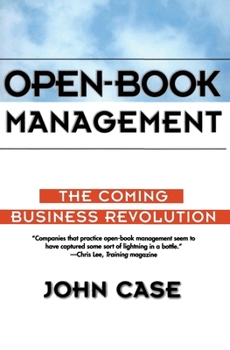Open-Book Management: Coming Business Revolution, the
Select Format
Select Condition 
Book Overview
Open-book management is not so much a technique as a way of thinking, a process that actively involves employees in the financial life of the company. Numerous companies have already found that employees who are informed and aware of the company's financial situation are motivated to seek solutions to problems and assume a greater degree of responsibility for its performance. John Case begins by examining the current competitive climate and the...
Format:Paperback
Language:English
ISBN:0887308023
ISBN13:9780887308024
Release Date:April 1996
Publisher:Harper Business
Length:224 Pages
Weight:0.44 lbs.
Dimensions:0.6" x 5.3" x 7.2"
Customer Reviews
3 ratings
This is THE KEY to successful management!
Published by Thriftbooks.com User , 20 years ago
What do TQM, reengineering, empowerment, teaming, and even six sigma have in common? They all implement parts of open-book management. And that's the reason they all have spotty records- they were successful when they, accidentally, incorporated enough of the rest of open-book management.The principle here is very simple- instead of your company or division relying on only the handful of minds at the top of the organization to improve the company, it treats all the employees as adults with brains and encourages everyone to work for the company's benefit. This also has the effect of reducing or eliminating office politics since everyone's pulling in the same direction.How? Fortunately the process is pretty simple, though it needs to be tailored to each business. The pieces are: 1. Giving employees all relevant financial information, 2. Giving employees training to understand the financial information, 3. Giving employees appropriate responsibility for the numbers under their control, and 4. Giving employees appropriate stakes in the outcomes (through bonuses, stock, options, etc.).
It's Here...It's Now...It's Happening
Published by Thriftbooks.com User , 24 years ago
When Open-Book Management was first in 1995, its subtitle suggested "The Coming Business Revolution." Well, that "revolution" has arrived and author John Case deserves much of the credit. In the Introduction, however, he makes it crystal clear that open-book management is NOT a panacea, is NOT a substitute for TQM or reengineering or any other operational overhaul, and is NOT a single system. In essence, open-book management helps companies to create a shared environment in which everyone understands that they are competing in a marketplace, trying to make money. But for whom? Frequently, effective ownership has been limited to relatively few people. In privately-held companies, usually to a single person and/or to a family. Presumably Case agrees with Al Ehrbar (author of EVA) that the traditional concept of "ownership" must be re-defined so that everyone involved in a given enterprise assumes personal responsibility for adding value. Hence the importance of recognition of peak performance but also the importance of financial incentives. "What's in it for me?" is a quite legitimate question. Given the increasingly greater impact of globalization, the information revolution, and what Case calls "entrepreneuralization", companies must find new and better ways to answer that question. For Case, each company needs a mission, a strategy. "But more than anything else it needs eager, willing employees, people who have a reason to care about their employer's prosperity and who know how to help it succeed."Ultimately, the measurable value of open-book principles will be determined by several factors: The extent to which a company modifies them to accommodate its own circumstances; the extent to which employees in that company (top to bottom) commit to the program, once devised; and the extent to which everyone involved shares equitably (NOT equally) in the rewards.Those who admire this book as much as I do will presumably want to read (if they have not already read) The Open-Book Field Book and The Open-Book Experience. These two books develop in much greater detail the material first introduced in Open-Book Management. Also, they provide an absolutely essential guide to deriving maximum benefit from John Case's wisdom and experience.
Employees at open book companies act (and profit)like owners
Published by Thriftbooks.com User , 28 years ago
Case shows, with many examples from open book companies, that companies' performance really takes off (or pulls out of jeopardy) when they organize to: 1. Give all their financial information to all employees; 2. Teach employees to understand it; and 3. Give employees a financial stake in how the company performs. In summary, experience shows that employees at open book companies act like owners. Case shows exactly how to do it. Give this book to your boss!





